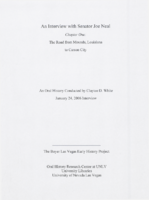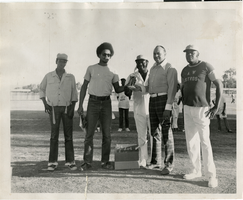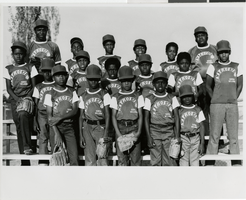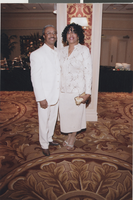Search the Special Collections and Archives Portal
Search Results

Transcript of first interview with Senator Joe Neal by Claytee D. White, January 24, 2006
Date
Archival Collection
Description
First interview in a series of five with Nevada State Senator Joe Neal conducted by Claytee D. White on January 24, 2006. Born in Mounds, Louisiana, in 1935, Neal joined his family in Las Vegas as a young man shortly before serving in the United States Air Force from 1954 to 1958. Following his military service, he earned a bachelor's degree in political science at Southern University in Baton Rouge, Louisiana. Neal continued his education at the Institute of Applied Science in Chicago, Illinois, with postgraduate work in law. From 1973 to 2001, he served in the Nevada Legislature as the Senator from Clark County Senatorial District No. 4. In the first interview, Neal recalls his childhood, moving to Las Vegas as a teenager, and joining the Air Force. He discusses his early experiences in politics and his involvement in various issues.
Text

Transcript of second interview with Senator Joe Neal by Claytee D. White, February 7, 2006
Date
Archival Collection
Description
Second interview in a series of five with Nevada State Senator Joe Neal conducted by Claytee D. White on February 7, 2006. Born in Mounds, Louisiana, in 1935, Neal joined his family in Las Vegas as a young man shortly before serving in the United States Air Force from 1954 to 1958. Following his military service, he earned a bachelor's degree in political science at Southern University in Baton Rouge, Louisiana. Neal continued his education at the Institute of Applied Science in Chicago, Illinois, with postgraduate work in law. From 1973 to 2001, he served in the Nevada Legislature as the Senator from Clark County Senatorial District No. 4. In the second interview, Neal focuses on his work during the 1960s and 1970s.
Text

Transcript of interview with Johnny Pate and Jillean Williams by Claytee D. White, March 4, 2004
Date
Archival Collection
Description
Interview with Johnny Pate and Jillean Williams conducted by Claytee D. White on March 4, 2004. As a jazz pianist and composer, Pate was a close friend to legendary singer Joe Williams. Pate and Williams share fond memories of touring with Joe Williams and the Count Basie Orchestra, cruises on the Norwegian line, and playing at the Dunes. Williams recalls moving to Las Vegas with Joe in 1968 and their first home on the Las Vegas Country Club golf course, where they were visited by the likes of Joe Lewis, Perry Como, and Andy Williams. Pate also details his long career, which began with teaching himself piano, tuba, and bass fiddle in the Army, and progressed to arranging and composing, which led over time to record company deals and film scores. Teaching at UNLV, Pate continues the yearly benefit concert to raise money for the Joe Williams scholarship fund.
Text
Audio recording clip of interview with Rev. Marion D. Bennett, Sr. by Claytee D. White, January 12, 2004
Date
Archival Collection
Description
Part of an interview with Rev. Marion D. Bennett, Sr. conducted by Claytee D. White on January 12, 2004. Bennett recalls working with Los Angeles labor organizer Jim Anderson to form the Nevada Voters League.
Sound
Estrada, M. 2001. Draft and Final Environmental Impact Statement for the F-22 Air Force Development Evaluation and Weapons School Beddown at Nellis Air Force Base. Letter from M. Estrada (DAF) to D. Siekerman (Jason Technologies), with attachment, 2001 July 03
Level of Description
Archival Collection
Collection Name: Environmental Radiation Protection Standards for Yucca Mountain, Nevada
Box/Folder: Box 38
Archival Component
Audio recording clip of interview with Cora Williams by Kathlyn E. Wilson, March 11, 1975
Date
Archival Collection
Description
Part of an interview with Cora Williams by Kathlyn E. Wilson on March 11, 1975. Williams describes early housing in West Las Vegas and explains how blacks helped each other build homes despite their inability to obtain loans.
Sound

Transcript of interview with Hanford Searl by Dennis McBride, November 2, 1996
Date
Archival Collection
Description
Dennis McBride interviews Hanford Searl about a number of things: his being gay, his being gay in Las Vegas and other places, religious issues. Also, some information about working at the Las Vegas Review-Journal, and for Bob Brown at the Las Vegas Valley Times.
Text

Photograph of Aaron Williams presenting a trophy to a group of adults, ca. 1970
Date
Archival Collection
Description
Black and white photograph of Aaron Williams (plaid pants) presenting a trophy to a group of four men, ca. 1970. The man at right wears an "A.W. Astros" t-shirt.
Image

Photograph of youth baseball team "Aaron Williams Astros," ca. 1970
Date
Archival Collection
Description
Black and white group photograph of the Aaron Williams youth boys' baseball team. The players wear uniform shirts with the team name "Astros."
Image

Dave and Marcia Washington: photograph
Date
Archival Collection
Description
Color photograph of Dave and Marcia Washington at Dave Washington's retirement party in 2007.
Image
